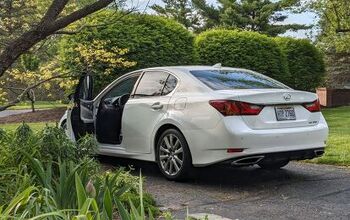UAW Negotiations: The Blame Game
The contract negotiations between the Detroit automakers and The United Autoworkers Union (UAW) continue apace. The employers are adamant: they need union concessions to survive. BIG concessions. Citing a $25/hour labor cost differential between their operations and those of the transplants, The Big 2.8 claim their salvation depends on taking food from union workers' table negotiating large pay and benefit cuts. But would such concession from the carmakers' "partners" actually bail them out of hot water?
First, the majority of that disparity comes down to The Big 2.8's retiree overhang. Including workers' spouses, Chrysler pays health care and pensions to 78,435 non-active UAW beneficiaries. Ford pays out to 123,007 off-line union dependents. And GM signs checks to 338,902 non-working union members. Take those numbers out of the equation and the actual direct labor costs between domestic and transplant automakers are roughly comparable.
Second, when it comes to union concessions, what's the big deal? For the sake of argument, let's say the UAW negotiators lose their collective [bargaining] minds and agree to a $20/hour cut. GM has approximately 80K active UAW workers on its payroll. Cutting $20/hour from their union personnel costs will save them $1.6m/hour. Now, let's take that out to a year, based on a 40-hour work week (2,080 hrs/year). In theory, GM would save $3.3b/year.
Let's also assume GM sets up a union-controlled VEBA for UAW retiree health care. That little item would run anywhere from $30b to $40b. While a UAW VEBA would only require a one-time payment of cash and stock, it would take The General at least ten years to recoup the cost from the resulting savings.
Ford? Same boat. FoMoCo's in hock up to and including their Blue Oval, facing a mountain of long-term debt. Any savings The Blue Oval Boys realize from cutting UAW salaries/benefits might cover their interest payments. Chrysler must fry the same fish.
Detroit must look for more fundamental solutions. The Big 2.8's existing union contracts and a woeful lack of flexible manufacturing capacity make it cheaper to keep a factory turning out cars (and let them pile up on storage lots) than it is to suspend production (and let supply decrease to match diminished demand). The results: excess inventory, fire sales,and continued brand degradation. Union negotiations need to focus on facilitating efficient operations, rather than simply cutting costs.
Meanwhile, the crucial adjustments must come from management. They can try to lay blame wherever they want, but the union didn't approve the lackluster designs that have been rolling out of Detroit for years. The union's not responsible for badge-engineered product planning. The union didn't fill the executive suites with yes men (and women) who will kiss whatever they have to kiss to keep their jobs. And the union had nothing to do with putting beancounters in charge instead of engineers.
Bottom line: labor costs have zero impact on what cars consumers decide to buy. You could argue that an extra grand here and there– taken out of direct costs and plowed back into new vehicles– would make The Big 2.8's vehicles more competitive. Given the failure of heavily discounted domestic product to strike back against the Toyotas of the world, you could make an equally compelling case that lowering the domestics' production costs wouldn't have any impact on the end result and, thus, U.S. consumers' choices.
While Mulally's Ford seems to "get it." GM under Wagoner singularly fails to recognize this simple fact. And Chrysler is now even more of a question mark. Lest we forget, the automakers have been digging themselves into this very deep hole for a very long time. Decades of hit-or-miss product planning, questionable quality, emphasis on quarterly profits instead of long-term results and obscene executive bonuses have all yielded a lineup that can't cut the mustard.
There's only one way to "save" Detroit. American automakers and their unions must set aside their adversarial relationship and find a way to build the world's best cars– price no object. That's right: they must stop focusing on margins and start focusing on market share. Making a small profit on a smaller and smaller slice of the U.S. market will do nothing more than prolong The Big 2.8's agonizing journey on the road to oblivion. They need to recapture the high ground, destroy the transplants' mindspace advantages, restore America's carmaking reputation and THEN think about profits.
Is there enough time? Probably not. At this point, committing all remaining resources to building the world's best automobiles at any cost is a death or glory strategy that has more than a whiff of the grave to it. But thinking that Detroit's future depends largely on reducing labor costs is the worst kind of self-delusion: the kind without any chance of working.
More by Frank Williams
Latest Car Reviews
Read moreLatest Product Reviews
Read moreRecent Comments
- Spectator Wild to me the US sent like $100B overseas for other peoples wars while we clammer over .1% of that money being used to promote EVs in our country.
- Spectator got a pic of that 27 inch screen? That sounds massive!
- MaintenanceCosts "And with ANY car, always budget for maintenance."The question is whether you have to budget a thousand bucks (or euro) a year, or a quarter of your income.
- FreedMike The NASCAR race was a dandy. That finish…
- EBFlex It’s ironic that the typical low IQ big government simps are all over this yet we’re completely silent when oil companies took massive losses during Covid. Funny how that’s fine but profits aren’t. These people have no idea how business works.


































Comments
Join the conversation
Toyota - Made In America - No Union - Profitable and growing. Ford - Made In America (somewhat) - Unionized - losing money and marketshare... Hmmmm.....what's the difference between these two?
[...] argued their way into a fiscal choke-hold that threatens to asphyxiate them both. Over a year ago, Frank Williams wrote that even with unprecedented concessions from labor, only a “death or glory” charge in [...]